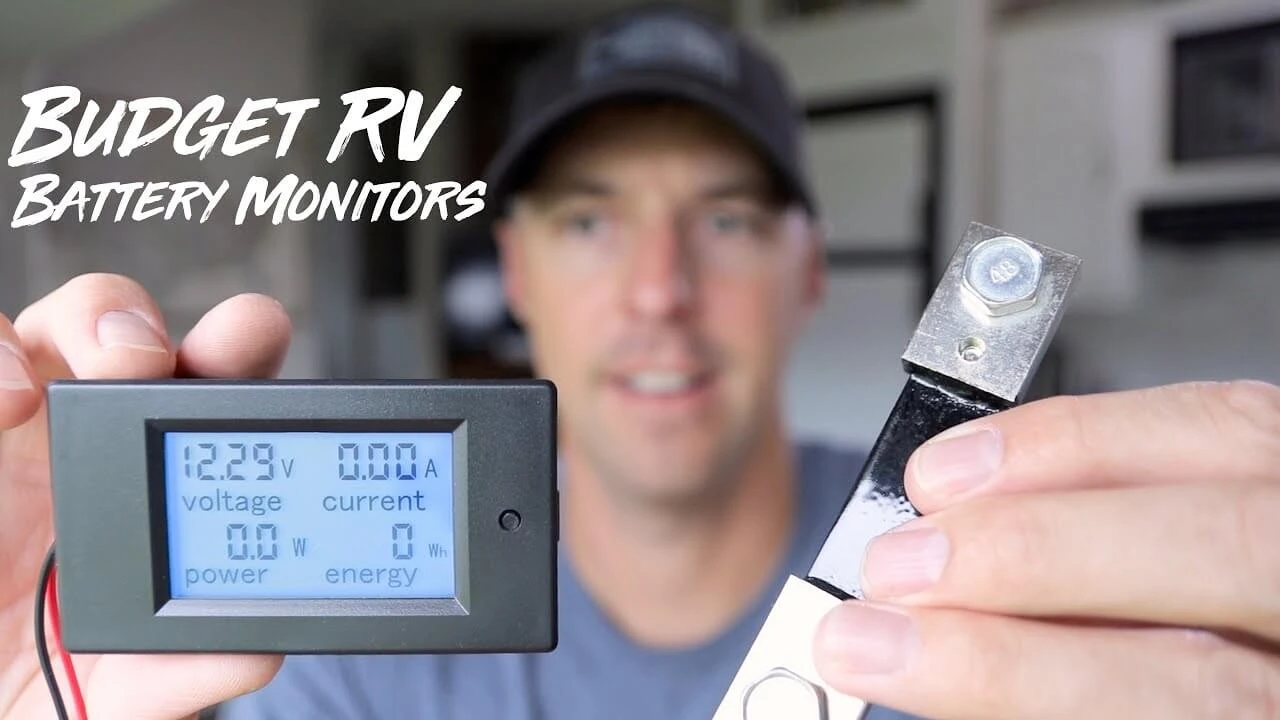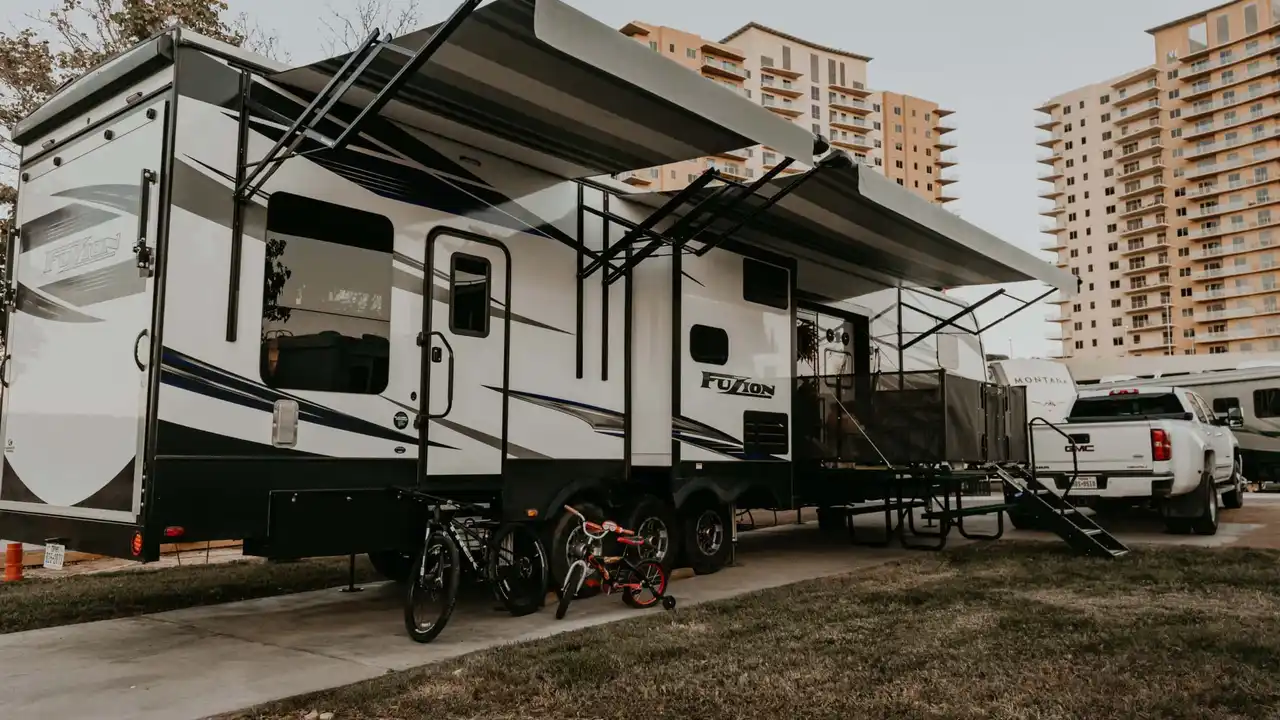RV Battery Monitors: Tracking Battery Health

Understanding RV Battery Systems The Heart of Your Mobile Life
Your RV's battery system is the lifeblood of your mobile adventures. It powers your lights, appliances, and essential systems, allowing you to enjoy the comforts of home while exploring the great outdoors. But understanding and managing your RV batteries can be a daunting task. That's where RV battery monitors come in. They provide real-time data and insights into your battery's health, usage, and remaining capacity, empowering you to make informed decisions and avoid unexpected power outages.
Why RV Battery Monitoring is Crucial For Worry Free Travel
Imagine being miles away from civilization, only to discover that your RV batteries are completely drained. No lights, no water pump, no refrigerator – just darkness and discomfort. This scenario is easily avoidable with a reliable RV battery monitor. These devices provide crucial information that allows you to:
- Prevent Battery Damage: Deep discharging lead-acid batteries significantly shortens their lifespan. A monitor alerts you before this happens, allowing you to take corrective action.
- Optimize Energy Usage: By tracking your power consumption, you can identify energy hogs and adjust your habits to conserve power.
- Plan Your Trips Effectively: Knowing your battery's remaining capacity allows you to accurately estimate how long you can stay off-grid.
- Troubleshoot Electrical Issues: Unexplained battery drain can indicate a problem in your electrical system. A monitor can help you pinpoint the source of the issue.
- Extend Battery Lifespan: Consistent monitoring and responsible usage, facilitated by a battery monitor, can significantly extend the life of your expensive RV batteries.
Types of RV Battery Monitors Choosing the Right One For You
RV battery monitors come in various forms, each with its own set of features and benefits. Understanding the different types will help you choose the best option for your needs and budget.
Basic Voltage Meters Simple and Affordable RV Battery Monitoring
Voltage meters are the simplest and most affordable type of RV battery monitor. They display the current voltage of your battery bank. While they provide a basic indication of battery charge, they lack the detailed information offered by more advanced monitors.
Pros:
- Inexpensive
- Easy to install
- Simple to use
Cons:
- Limited information
- Doesn't account for battery load
- Can be inaccurate under heavy load
Amp Hour Counters Measuring Energy Consumption in Your RV
Amp-hour counters, also known as battery capacity monitors, track the amount of energy flowing into and out of your battery bank. They provide a more accurate representation of battery charge than voltage meters by accounting for the current draw of your appliances and devices.
Pros:
- More accurate than voltage meters
- Displays remaining battery capacity
- Tracks energy consumption
Cons:
- More expensive than voltage meters
- Requires more complex installation
- Needs to be calibrated for your specific battery bank
Comprehensive Battery Management Systems The Ultimate RV Battery Monitoring Solution
Battery management systems (BMS) are the most advanced type of RV battery monitor. They provide a comprehensive overview of your battery system, including voltage, current, state of charge, temperature, and more. Some BMS also offer features like remote monitoring, data logging, and automatic alerts.
Pros:
- Most accurate and detailed information
- Advanced features like remote monitoring and data logging
- Protects batteries from overcharging and over-discharging
Cons:
- Most expensive option
- Requires the most complex installation
- Can be overwhelming for beginners
Key Features to Look For in an RV Battery Monitor Ensuring Optimal Performance
When choosing an RV battery monitor, consider the following features to ensure it meets your specific needs:
- Accuracy: The monitor should provide accurate readings of voltage, current, and state of charge.
- Ease of Use: The display should be clear and easy to read, and the controls should be intuitive.
- Installation: Consider the complexity of the installation process. Some monitors are easier to install than others.
- Connectivity: Some monitors offer Bluetooth or Wi-Fi connectivity, allowing you to monitor your battery status remotely.
- Alerts: The monitor should provide alerts when your battery voltage is low or when other critical parameters are outside of acceptable ranges.
- Data Logging: Data logging allows you to track your battery's performance over time, helping you identify trends and potential problems.
- Compatibility: Ensure the monitor is compatible with your battery type (e.g., lead-acid, lithium).
Top RV Battery Monitor Recommendations Expert Picks For Reliable Power Management
Here are some of the top RV battery monitors currently available on the market:
Victron Energy BMV 712 Smart Battery Monitor A High Performance Option
The Victron Energy BMV 712 Smart Battery Monitor is a popular choice among RVers due to its accuracy, reliability, and comprehensive feature set. It displays voltage, current, amp-hours consumed, state of charge, time-to-go, and temperature. It also features Bluetooth connectivity, allowing you to monitor your battery status from your smartphone or tablet.
Pros:
- Highly accurate
- Bluetooth connectivity
- Comprehensive feature set
- Easy to install (for experienced users)
Cons:
- Relatively expensive
- Requires some technical knowledge to install
Use Cases: Ideal for RVers who want a comprehensive and accurate battery monitoring solution and are comfortable with a more complex installation.
Pricing: Approximately $200 - $250.
Renogy Battery Monitor With Bluetooth Capability A Budget Friendly Alternative
The Renogy Battery Monitor with Bluetooth Capability is a more affordable option that still offers a good balance of features and performance. It displays voltage, current, state of charge, and remaining capacity. It also features Bluetooth connectivity for remote monitoring.
Pros:
- Affordable
- Bluetooth connectivity
- Easy to install
Cons:
- Less accurate than the Victron BMV 712
- Fewer features
Use Cases: A good choice for RVers who want a reliable battery monitor with Bluetooth connectivity at a more affordable price point.
Pricing: Approximately $80 - $120.
AiLi Voltmeter Ammeter Battery Monitor A Simple and Cost Effective Solution
The AiLi Voltmeter Ammeter Battery Monitor is a basic but functional option for RVers who primarily need to monitor voltage and current. It's easy to install and use, making it a good choice for beginners.
Pros:
- Very affordable
- Easy to install
- Simple to use
Cons:
- Limited features
- Less accurate than more advanced monitors
Use Cases: Suitable for RVers who need a basic voltage and current monitor and are on a tight budget.
Pricing: Approximately $20 - $40.
Simarine Pico Battery Monitor System A Premium and Customizable System
The Simarine Pico Battery Monitor System is a premium option that offers a high level of customization and advanced features. It can monitor multiple battery banks, tanks, and temperatures. It also features a color display and a user-friendly interface.
Pros:
- Highly customizable
- Monitors multiple battery banks, tanks, and temperatures
- Color display
- User-friendly interface
Cons:
- Very expensive
- Requires professional installation
Use Cases: Ideal for RVers with complex electrical systems who want a comprehensive and highly customizable monitoring solution.
Pricing: Approximately $500 - $1000+ depending on configuration.
RV Battery Monitor Installation Tips Ensuring a Secure and Accurate Setup
Proper installation is crucial for the accuracy and reliability of your RV battery monitor. Here are some essential tips:
- Read the Instructions Carefully: Always read the manufacturer's instructions thoroughly before beginning the installation process.
- Disconnect the Batteries: Disconnect the negative terminal of your batteries before working on any electrical components.
- Use the Correct Wiring: Use appropriately sized wiring for the monitor's power and signal connections.
- Properly Ground the Monitor: Ensure the monitor is properly grounded to the RV chassis.
- Calibrate the Monitor: Follow the manufacturer's instructions for calibrating the monitor to your specific battery bank.
- Secure All Connections: Double-check all connections to ensure they are secure and tight.
- Test the Monitor: After installation, test the monitor to ensure it is functioning correctly.
RV Battery Monitor Use Cases Real World Examples of Power Management
Let's explore some real-world scenarios where an RV battery monitor can be invaluable:
- Dry Camping in National Parks: You're boondocking in a national park with no hookups. Your battery monitor helps you conserve power by showing you exactly how much energy your appliances are consuming, allowing you to adjust your usage and extend your stay.
- Overnight Stays at Rest Stops: You're traveling long distances and need to stay overnight at rest stops. Your battery monitor allows you to run your lights and fans without worrying about draining your batteries completely.
- Monitoring Solar Panel Performance: If you have solar panels, your battery monitor can show you how much energy your panels are generating and how effectively they are charging your batteries.
- Diagnosing Battery Problems: You notice that your batteries are draining faster than usual. Your battery monitor helps you identify the cause of the problem, such as a faulty appliance or a parasitic draw.
- Extending Battery Lifespan: By monitoring your battery's state of charge and avoiding deep discharges, you can significantly extend its lifespan and save money on replacements.
RV Battery Monitor Maintenance Tips Keeping Your System in Top Condition
To ensure your RV battery monitor continues to provide accurate and reliable readings, follow these maintenance tips:
- Keep the Display Clean: Clean the display with a soft, dry cloth to remove dust and fingerprints.
- Check Connections Regularly: Periodically check the wiring connections to ensure they are secure and tight.
- Recalibrate as Needed: Recalibrate the monitor periodically, especially if you notice any inaccuracies in the readings.
- Protect from Extreme Temperatures: Avoid exposing the monitor to extreme temperatures or direct sunlight.
- Replace Batteries as Needed: If the monitor uses batteries, replace them regularly to ensure accurate operation.
RV Battery Monitor Troubleshooting Common Issues and Solutions
Even with proper installation and maintenance, you may occasionally encounter issues with your RV battery monitor. Here are some common problems and their solutions:
- Inaccurate Readings: Check the wiring connections, recalibrate the monitor, or replace the batteries.
- No Display: Check the power connections, replace the batteries, or contact the manufacturer for assistance.
- Monitor Not Communicating: Check the Bluetooth or Wi-Fi connection, update the firmware, or contact the manufacturer for assistance.
- False Alarms: Adjust the alarm settings, check the wiring connections, or recalibrate the monitor.
RV Battery Monitor and Solar Integration Maximizing Renewable Energy
Integrating your RV battery monitor with your solar power system allows you to optimize your renewable energy usage and maximize your off-grid capabilities. The battery monitor provides valuable insights into your solar panel's performance and your battery's state of charge, enabling you to make informed decisions about energy consumption and storage.
By tracking the amount of energy generated by your solar panels, you can adjust your energy usage to take advantage of peak sunlight hours. The battery monitor also helps you prevent overcharging your batteries, which can damage them and shorten their lifespan.
RV Battery Monitor and Lithium Batteries A Perfect Pairing For Optimal Performance
Lithium batteries are becoming increasingly popular in RVs due to their superior performance, longer lifespan, and lighter weight. However, lithium batteries require more sophisticated monitoring and management than traditional lead-acid batteries.
An RV battery monitor designed for lithium batteries can provide crucial information about voltage, current, temperature, and state of charge, allowing you to protect your investment and maximize the lifespan of your lithium batteries. Some advanced BMS systems even offer features like cell balancing and overcharge/over-discharge protection.
RV Battery Monitor Myths Debunked Separating Fact From Fiction
There are many misconceptions surrounding RV battery monitors. Let's debunk some common myths:
- Myth: You only need a battery monitor if you have solar panels. Fact: A battery monitor is beneficial for all RVers, regardless of whether they have solar panels. It helps you manage your energy usage and prevent battery damage.
- Myth: Voltage meters are accurate enough for RV battery monitoring. Fact: Voltage meters provide a basic indication of battery charge, but they are not as accurate as amp-hour counters or battery management systems.
- Myth: All battery monitors are difficult to install. Fact: Some battery monitors are very easy to install, while others require more technical expertise. Choose a monitor that matches your skill level.
- Myth: Battery monitors are only for experienced RVers. Fact: Battery monitors are user-friendly and can be beneficial for RVers of all experience levels.
Future of RV Battery Monitoring Technological Advancements on the Horizon
The field of RV battery monitoring is constantly evolving, with new technologies and features emerging all the time. Some exciting advancements on the horizon include:
- More Accurate Sensors: New sensors are being developed that provide even more accurate readings of voltage, current, and temperature.
- Improved Connectivity: Battery monitors are becoming increasingly connected, with more options for remote monitoring and data logging.
- Artificial Intelligence: AI is being used to analyze battery data and provide predictive maintenance alerts.
- Integration with Smart Home Systems: Battery monitors are being integrated with smart home systems, allowing you to control your RV's electrical systems from a single interface.
RV Battery Monitor Resources Further Learning and Support
To learn more about RV battery monitors and related topics, here are some valuable resources:
- RV Forums: Online forums like RV.net and iRV2.com are great places to ask questions and get advice from experienced RVers.
- RV Blogs: Many RV bloggers write about battery monitoring and other electrical topics.
- Manufacturer Websites: Visit the websites of battery monitor manufacturers for detailed product information and support.
- RV Service Centers: Contact your local RV service center for professional installation and maintenance services.
By understanding the importance of RV battery monitoring, choosing the right monitor for your needs, and following proper installation and maintenance procedures, you can ensure that your RV's battery system remains healthy and reliable for years to come. This will allow you to enjoy your RV adventures with peace of mind, knowing that you have the power you need to stay comfortable and connected.
:max_bytes(150000):strip_icc()/277019-baked-pork-chops-with-cream-of-mushroom-soup-DDMFS-beauty-4x3-BG-7505-5762b731cf30447d9cbbbbbf387beafa.jpg)





